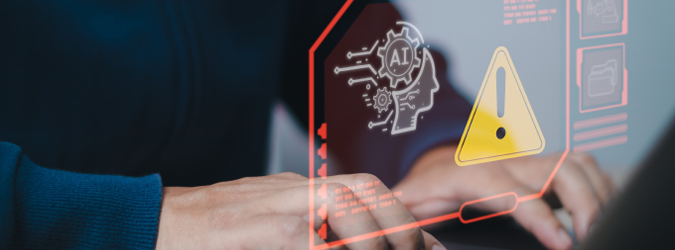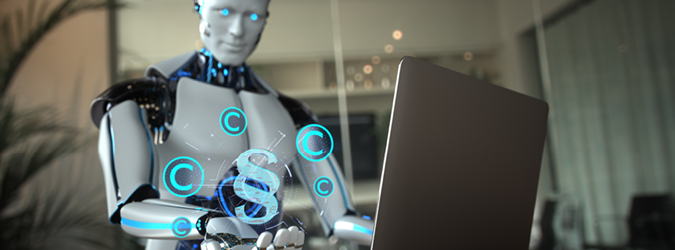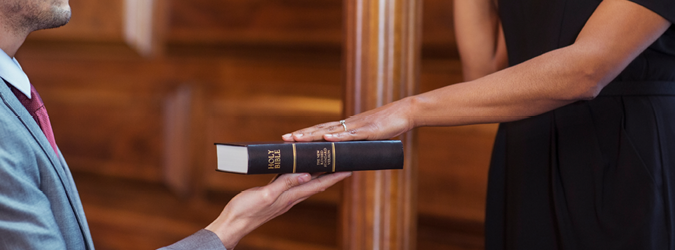Using AI in Your Practice? Proceed With Caution
8.7.2023

To the Forum:
Our firm was recently retained to handle a highly complex commercial action. The client is extremely cost-sensitive and asked that we do our best to keep costs lean wherever possible. We have been working on this case for several months, and the client has already asked for several discounts on their bill. I am concerned that we just received our client’s document production consisting of over 100,000 documents for review. As cost is a concern for the client, I was discussing the strategy on how to approach the review with my associate, and she suggested we use an AI review tool such as DIALOG DTE to review the documents using an algorithm to pull only highly relevant documents and save time and money. Call me old school, but I have significant concerns about running 100,000 highly sensitive business documents through an unsecure computer program. Further, I am not familiar with DIALOG DTE’s intricacies and other issues that may evolve in using this new AI tool as a discovery assistant. How do I know it is accurately pulling relevant documents? Are documents uploaded to DIALOG DTE protected and confidential?
My associate also told me it could even write briefs and create outlines of arguments for our firm. For obvious reasons, this program is extremely appealing to me as it could substantially increase the efficiency of my practice while keeping costs down for the client.
I asked DIALOG DTE its thoughts and it recommended its use. However, I am interested to hear your thoughts. Is the use of this program permitted under the Rules of Professional Responsibility? What are the applicable rules of the road?
Sincerely,
Ould Skewl
Dear Ould Skewl:
Artificial intelligence tools such as DIALOG DTE, though still relatively new in the legal profession, raise a number of ethical concerns that you should keep in mind if you are considering using one in your case. For example, under the New York Rules of Professional Conduct (RPC) lawyers have a duty of competence, which extends to staying abreast of innovations in technology that are widely used in legal practice. In the case you present to us, the use of AI is currently minimal, but all trends seemingly point to increased use in law offices. We definitely agree that the use of artificial intelligence tools and platforms such as DIALOG DTE can be extremely helpful in maximizing a lawyer’s efficiency; however, we urge you to use great caution in doing so.
The NYSBA Committee on Professional Ethics has opined that an attorney should only use technology that he or she is competent to use.[1] Thus, before using any technology in your practice, including DIALOG DTE, you should take appropriate steps to ensure that the attorneys using the program are familiar with the platform’s operating, and the terms of use associated with the use of its programs, to ensure you are meeting the competence standard.
But knowledge is only half the battle. Attorneys also should be aware of the heightened risks of using novel programs such as DIALOG DTE in their practice. Comment [8] to RPC 1.1 states: “to maintain the requisite knowledge and skill, a lawyer should . . . keep abreast of the benefits and risks associated with technology the lawyer uses to provide services to clients or to store or transmit confidential information.” As addressed in a prior Forum, attorneys and law firms have an ethical obligation to institute and maintain sound cybersecurity protocols and to ensure that third-party vendors do the same.[2] It is not clear from your question whether your firm has the ability to ensure that DIALOG DTE is maintaining sound cybersecurity protocols before uploading confidential client information. In such cases, NYSBA suggests informing the client of the risks associated with using the program and obtaining the client’s informed consent before proceeding.[3]
To that end, your question raises several concerns involving a lawyer’s duty of competence. Specifically, from your question it appears that DIALOG DTE will essentially be stepping in the shoes of the lawyer to make determinations about what documents are relevant and responsive, which raises an ethical question of first impression: Does the duty of competence extend to DIALOG DTE? Are you assuming the risks associated with using such a program? We assume that you will check the results of the work performed by DIALOG DTE when it is complete, which raises another important question: Will it really save you that much time such that the benefits outweigh the risks? Given the novelty of the issues presented, we don’t have clear guidance for you, which is all the more reason to tread lightly when using AI platforms such as DIALOG DTE.
When using AI platforms in your practice, it is important to note that the lawyer ultimately has the responsibility to check the work of the AI platform to ensure that it’s accurate. Failure to do so can have embarrassing consequences. For example, a lawyer recently used another AI platform called ChatGPT to prepare a brief opposing a defense request to have the case dismissed. In the document submitted to the court, the lawyer cited court decisions pulled by ChatGPT in support of his client’s position. As it turns out, the cases cited by ChatGPT were completely fabricated. The court made counsel appear for a hearing before the court to explain his conduct and eventually imposed sanctions on counsel, finding his conduct to be in bad faith.[4] In recognizing the potential harm that can occur when lawyers use AI tools irresponsibly, Judge Castel stated: “It promotes cynicism about the legal profession and the American judicial system. And a future litigant may be tempted to defy a judicial ruling by disingenuously claiming doubt about its authenticity.”[5]
With respect to the portion of your question regarding protecting client confidences, we urge you to exercise extreme caution. The maintenance of client confidences is critical to our profession as lawyers. Our duty of confidentiality encourages clients to communicate fully and honestly with their lawyers.[6] Effective representation is dependent on confidentiality. Clients must feel confident and comfortable providing their lawyers with sensitive and embarrassing information and documents under the understanding that such information with be held with the utmost confidence. We discussed a lawyer’s confidentiality obligations at length in a prior Forum.[7] RPC 1.6(a) tells us that a lawyer shall not knowingly reveal confidential information or use such information to the disadvantage of a client or for the advantage of the lawyer or a third person, unless: (1) the client gives informed consent; (2) the disclosure is impliedly authorized to advance the best interests of the client and is reasonable under the circumstances or customary in the professional community; or (3) the disclosure is permitted pursuant to 1.6(b). The rule prohibits lawyers from using information gained during the representation of a client for the lawyer’s benefit or a third party, such as another client, absent informed consent.[8]
Your question recognizes that there is a real risk of running afoul of your confidentiality obligations to the client in using programs such as DIALOG DTE, given that it is still relatively unknown where documents that are uploaded to the platform are stored and if such location is reasonably protected. We recommend learning as much as you can about DIALOG DTE’s privacy and security measures before agreeing to use the platform on any of your cases. And, if you have any concerns that your client’s confidential information may not be reasonably protected, speak with the clients, inform them of the risks and let them make the decision.
Although not specifically asked in your question, there is another ethical consideration that must be considered when lawyers use AI tools: RPC 5.5, which governs the unauthorized practice of law. RPC 5.5(a) states that “[a] lawyer shall not practice law in a jurisdiction in violation of the regulation of the legal profession in that jurisdiction.” Subsection (b) of RPC 5.5 further states “a lawyer shall not aid a nonlawyer in the unauthorized practice of law.” It is important to note that Comment [2] to RPC 5.5 provides an exception to the unauthorized practice of law where a lawyer supervises work he or she has delegated and retains responsibility for the non-lawyer’s work. As Professor Simon notes, the prohibition against the practice of law by a non-lawyer is grounded in the public’s right to the integrity and competence of those who undertake to render legal services.[9] Because a non-lawyer who undertakes to handle legal matters is not technically subject to the same rules that apply to lawyers (i.e., the RPC), the unauthorized practice of law is viewed by many as a potential threat to the integrity of our profession. The classic test of whether an activity is considered the unauthorized practice of law is whether the non-lawyer exercised legal judgment, especially the application of law to a particular set of facts.[10]
Here, it appears that DIALOG DTE would be exercising legal judgment in determining which documents were relevant to the issues in the case and which are not. Furthermore, if you use the platform to draft briefs and deposition outlines, the platform is essentially performing all the functions of a lawyer without the requisite credentials. Needless to say, this raises unique concerns about whether such use of the platform would constitute the unauthorized practice of law. Although the rule provides for an exception where the work performed by a non-lawyer is supervised by an attorney (which we assume you will do here), you must ask yourself whether you want to assume liability in the event the program doesn’t work as expected.
All in all, while these AI tools are obviously becoming part of practicing law in the 21st century, we recommend extreme care when using AI. Lawyers must always exercise competent legal judgment in the best interests of their client. When in doubt, we suggest erring on the side of caution.
Sincerely,
The Forum by
Vincent J. Syracuse
([email protected]) and
Alyssa C. Goldrich
Tannenbaum Helpern Syracuse & Hirschtritt LLP
QUESTION FOR THE NEXT FORUM:
To the Forum:
I am an attorney working for one of the federal courts in New York State. When I first began working with the court about a year ago, one of the clerks who handles criminal case intake took me under his wing and guided me through my first year. We became close friends over the last year, and he even attended my wedding. As a result, we developed a very trusting relationship, but he recently revealed something that I feel compelled to report.
A few days ago, I took the clerk out to lunch to thank him for staying late to help me sift through piles of discovery the past week. Over lunch, the clerk mentioned that the job is “so worth it” because he has a side hustle that more than doubles his salary. When I asked him what he meant, he disclosed that he refers criminal defendants who have court-appointed counsel to private defense lawyers by giving them their business card or calling the lawyers directly. These defense lawyers pay the clerk thousands of dollars per referral in cash under the table.
When I asked how long he had been doing this, the clerk replied, “Much longer than you’ve been here. I’ve got a book full of lawyers that I refer to. You wouldn’t believe the killing I’ve made. I didn’t buy that car on a court clerk’s salary alone, I’ll tell you that,” and gestured toward his Mercedes in the parking lot. The look of shock on my face must have made him nervous as he then said, “You can’t tell anyone though. I’ll get in a lot of trouble. If you want, I can loop you in.” I told him I would think about it, though I certainly was not thinking about it.
This side hustle doesn’t sound legitimate – possibly criminal – and I know that there must be applicable ethical rules and even criminal statutes that prohibit this aside from a duty to report.
Sincerely,
N.T. Toby Trusted
- See NYSBA Comm. on Prof’l Ethics, Op. 1025 (2014).
- See Vincent J. Syracuse, Maryann C. Stallone, Richard W. Trotter and Carl F. Regelmann, Attorney Professionalism Forum, N.Y. St. B.J., June 2017, Vol. 89, No. 5.
- See NYSBA Comm. on Prof’l Ethics, Op. 1020 (2014).
- See Mata v. Avianca, Inc., 22-CV-1461 (PKC) (S.D.N.Y. June 22, 2023).
- 5. Id.
- See New York Rules of Professional Conduct (RPC) 1.6 Comment [1].
- See Vincent J. Syracuse, Carl F. Regelmann, and Alexandra Kamenetsky Shea, Attorney Professionalism Forum, N.Y. St. B.J., February 2019, Vol. 91, No. 1.
- See RPC 1.6 Comment [4B].
- See Simon, Simon’s New York Rules of Professional Conduct Annotated, at 1293.
- Id.






